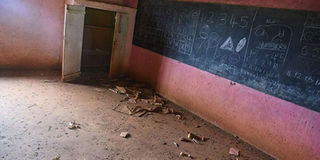Nyeri primary schools struggle to keep doors open

A photo taken on August 1, 2019 shows an abandoned classroom at Nguruwe-ini Primary School in Nyeri County. The school was closed in 2013. PHOTO | EVANS HABIL | NATION MEDIA GROUP
What you need to know:
- Enrolment in public primary schools in the county has decreased by 16 per cent in the last six years, putting ministry officials on the spot.
- Mr Gichuhi laments that most of his constituents are opting for smaller families, with the largest one having only three children. The result is empty schools.
Besides two stone blocks and a vandalised flag mast, nothing about Nguruwe-ini Primary School in Gikondi, Mukurwe-ini Sub-county, suggests that it is a school.
Classrooms though are in a functional state and the chalkboards still intact.
To keep off vandals, the school’s board of management hired a watchman, who also trims the grass, if only to ward off wild animals.
Nguruwe-ini was started as a District Education Board (DEB) school in 1994, admitting hundreds of learners in the next 15 years.
Things started spiralling downwards 10 years ago when the population started decreasing.
After struggling to attract learners for more than five years, the school finally closed shop in 2013. At the time, it had less than 30 learners.
"Some of the learners were transferred to the nearby Karindi Primary. The furniture was donated to the same school," says Mr David Kiiru, who served as chairman of the school’s board.
To prevent the classrooms and other facilities from wasting away, the board has since lent out a section of the school to be used by some of the departments of Mukurwe-ini Technical Training Institute (MTTI).
REPURPOSING
This move is in keeping with suggestions by Central Regional Coordinator of Education Margaret Lesuuda that unutilised classrooms in public schools will soon be converted into boarding and learning facilities for technical and vocational education and training centres (TVETs).
“We can’t have idle classrooms while students in some of our TVETs commute for long distances every day from home to school," says Ms Lesuuda.
Plans are also underway to use the remaining classrooms at Nguruwe-ini as offices for an upcoming sports academy.
After recent deliberations, the local community gave a nod for the purpose. "The school’s neighbours just wanted to see the school up and running again. They were happy when it was announced that a training camp would be established here," Mr Wilson Maina, a member of Karindi Marathon Committee, told the Nation.
COFFEE
But Nguruwe-ini is not alone in this mess. Alcoholism, rampant birth control and dwindling economic activities to thank, schools in Nyeri County are now struggling to keep their doors open to learners, a situation that has thrust education stakeholders and even political leaders in panic mode.
"Coffee was our mainstay here 20 years ago. That is not the case anymore. There is no money and raising children here is not easy. Our grandchildren have left to look for jobs in Nairobi and other places," says Mr Richard Muturi, a former teacher at Gikondi.
Thousands of families have moved from other sub-counties in Nyeri to settle in Kieni and Laikipia County, owing to the high agricultural potential in these areas.
Those left behind are usually less productive people, mostly the elderly.
When Basic Education Principal Secretary Belio Kipsang met school heads in Nyeri last month, he expressed concerns over the declining number of learners, remarking that "it can only get worse" for local schools.
TRANSITION POLICY
Dr Kipsang was in Nyeri to meet education stakeholders to discuss, among other things, enrolment in public schools as part of the government’s 100 per cent transition programme.
Enrolment in public primary schools in the county has decreased by 16 per cent in the last six years, putting ministry officials on the spot.
In 2014, there were 112,607 pupils in public primary schools in the region. By 2018, there were only 96,706 pupils.
At the ECDE centres alone, enrolment has declined from 23,000 pupils in 2016 to 19,000 this year.
Tetu MP James Gichuhi is a worried man. Mr Gichuhi laments that most of his constituents are opting for smaller families, with the largest one having only three children. The result is empty schools.
CONTRACEPTION
Data from the Ministry of Health shows that use of contraception among married women of the reproductive age in Kenya rose from 53 per cent in 2014 to 61 per cent in 2018. Overall, Central Kenya tops in contraceptive use at 73 per cent.
Gikondi primary, with a capacity of 500 learners, has only 30 pupils. In this red zone are also schools such as Gakira, Mwati and Wanguru with 93, 79 and 95 pupils respectively.
However, Karindi Primary School head teacher, Mr Wanyiri, is a proud man. The school boasts of 358 pupils.




